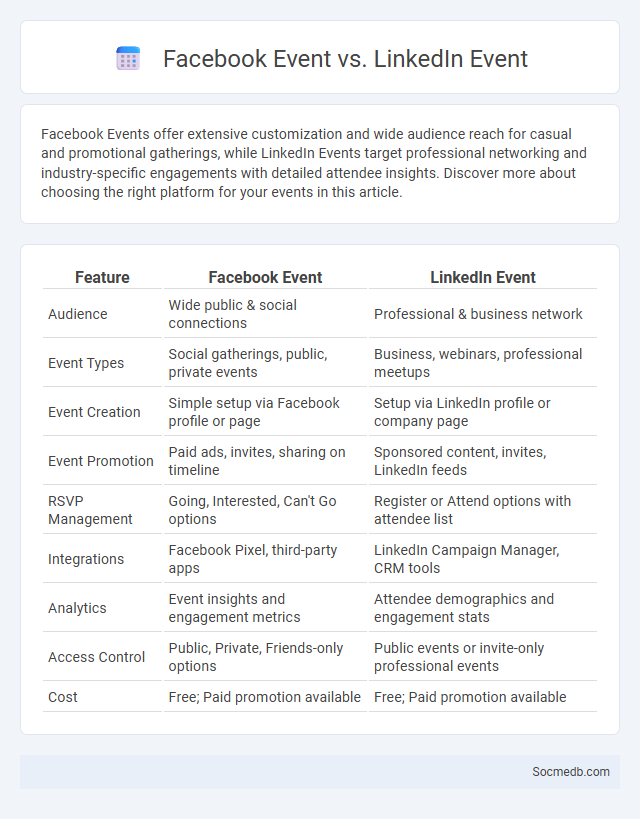
Photo illustration: Facebook Event vs LinkedIn Event
Facebook Events offer extensive customization and wide audience reach for casual and promotional gatherings, while LinkedIn Events target professional networking and industry-specific engagements with detailed attendee insights. Discover more about choosing the right platform for your events in this article.
Table of Comparison
| Feature | Facebook Event | LinkedIn Event |
|---|---|---|
| Audience | Wide public & social connections | Professional & business network |
| Event Types | Social gatherings, public, private events | Business, webinars, professional meetups |
| Event Creation | Simple setup via Facebook profile or page | Setup via LinkedIn profile or company page |
| Event Promotion | Paid ads, invites, sharing on timeline | Sponsored content, invites, LinkedIn feeds |
| RSVP Management | Going, Interested, Can't Go options | Register or Attend options with attendee list |
| Integrations | Facebook Pixel, third-party apps | LinkedIn Campaign Manager, CRM tools |
| Analytics | Event insights and engagement metrics | Attendee demographics and engagement stats |
| Access Control | Public, Private, Friends-only options | Public events or invite-only professional events |
| Cost | Free; Paid promotion available | Free; Paid promotion available |
Overview: Facebook Event vs LinkedIn Event vs Traditional Event
Facebook Events offer highly interactive features like real-time updates, RSVPs, and social sharing, making them ideal for broad community engagement. LinkedIn Events focus on professional networking, providing targeted audience reach with options for webinars and industry-specific discussions. Traditional events rely on in-person attendance and physical logistics, which may limit scalability and immediate engagement compared to digital platforms, but offer deeper face-to-face connections for your brand.
Audience Demographics and Platform Reach
Social media platforms attract diverse audience demographics, with Facebook boasting over 2.9 billion monthly active users, predominantly aged 25-34, while TikTok appeals strongly to Gen Z, capturing over 1 billion active users globally. Instagram reaches a broad range of users, with significant engagement from millennials and Gen Alpha, totaling around 2 billion monthly active accounts. LinkedIn targets professionals, offering access to more than 900 million members worldwide, making it essential for B2B marketing and networking.
Event Creation Process Comparison
The event creation process on social media platforms varies significantly in terms of user interface and feature sets, with Facebook offering detailed options such as event scheduling, guest lists, and ticket integrations, while Instagram focuses more on event promotion through Stories and third-party links. Twitter supports event announcements via tweets and hashtags but lacks dedicated event creation tools, whereas LinkedIn emphasizes professional events with features like RSVP tracking and calendar syncing. Choosing the ideal platform depends on target audience engagement, event complexity, and integration needs for seamless promotion and management.
Promotion and Visibility Features
Social media platforms offer advanced promotion and visibility features, including targeted advertising, hashtag optimization, and influencer partnerships, to enhance brand reach and engagement. Tools like Facebook Ads Manager and Instagram Sponsored Posts enable precise audience segmentation based on demographics, interests, and behaviors, maximizing campaign effectiveness. Integration of analytics dashboards helps track impressions, click-through rates, and conversion metrics, refining promotional strategies for higher visibility and ROI.
Engagement Tools and Interaction Options
Social media platforms offer diverse engagement tools such as polls, quizzes, and live videos that boost user interaction and content visibility. Interactive features like comment sections, direct messaging, and reaction buttons enable your audience to connect and communicate effectively, fostering a sense of community. Utilizing these tools enhances user participation and drives meaningful conversations around your content.
RSVP Management and Attendance Tracking
Social media platforms enhance RSVP management by enabling real-time event invitations and instant response tracking, significantly reducing manual coordination. Advanced attendance tracking leverages geotagging and check-in features, providing precise data on guest presence and engagement. Integration with analytics tools offers event organizers actionable insights to optimize future event planning and audience targeting.
Analytics and Performance Insights
Social media analytics provide detailed metrics on audience engagement, reach, and conversion rates, enabling brands to optimize content strategies effectively. Performance insights highlight top-performing posts, peak interaction times, and demographic data, which drive targeted marketing efforts and improve ROI. Leveraging tools like Facebook Insights, Twitter Analytics, and Instagram Insights helps businesses monitor social trends and adjust campaigns in real-time for maximum impact.
Integration with Other Marketing Channels
Social media platforms amplify marketing reach by seamlessly integrating with email campaigns, content marketing, and paid advertising strategies, creating cohesive brand messaging across channels. Leveraging social media analytics allows marketers to track customer behavior and tailor personalized promotions that enhance engagement and conversion rates. Cross-channel integration fosters consistent user experiences, driving higher ROI and strengthening brand loyalty in a competitive digital landscape.
Cost Implications and ROI Potential
Social media marketing involves varying cost structures including content creation, paid advertising, and platform management tools, which directly impact overall budgets. Effective campaigns demonstrate a strong ROI potential through increased brand awareness, customer engagement, and lead generation metrics. Investing strategically in analytics platforms is essential for optimizing spending and accurately measuring conversion rates and customer acquisition costs.
Choosing the Right Platform for Your Event Goals
Choosing the right social media platform for your event goals involves analyzing your target audience's preferences and behavior on sites like Facebook, Instagram, LinkedIn, and Twitter. Your content strategy should align with platform features, such as Instagram's visual-centric posts for brand engagement or LinkedIn's professional network for corporate events. Tailoring your approach ensures maximum reach and interaction, boosting event attendance and overall success.
 socmedb.com
socmedb.com